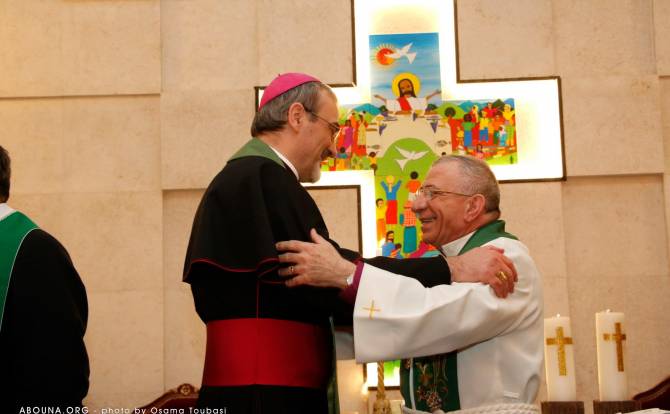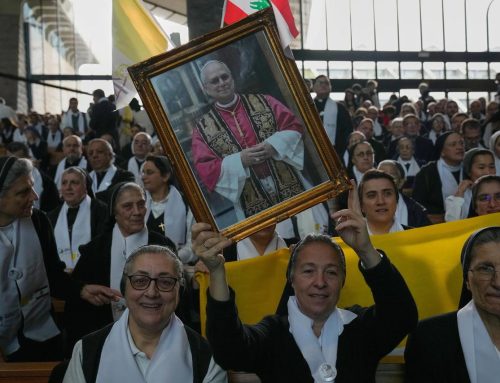Apostolic Administrator of the Latin Patriarchate in Jerusalem Most Rev. Pierbattista Pizzaballa and Bishop of the Evangelical Lutheran Church in Jordan and the Holy Land Munib Younan on Sunday, February 12, 2017 celebrated a joint thanksgiving service titled, “From Conflict to Partnership: Together in Hope”, at the Evangelical Lutheran Good Shepherd Church, Umm Al Summaq, Amman.
Present at the Mass were Apostolic Nuncio Monsignor Alberto Ortega Martin, Monsignor Roberto Cuna, a number of priests and pastors from both Churches, and several ambassadors.
At the outset of the service, parish pastor Samer Azar, said: “I am pleased to welcome you all in Amman, the capital of our Hashemite Kingdom of Jordan under the leadership of His Majesty King Abdullah Ben Al Hussein II, at the Church of the Good Shepherd whose name indicates that we are the children of a good shepherd. We are called upon to be good shepherds reconciled with ourselves, with each other, and with God to serve the parish and all people.”
He added: “While the world nowadays is witnessing a trend towards
conflicts, sectarianism and fragmentation, the Holy See in Rome and the Lutheran World Federation in Geneva are heading towards partnership. This partnership has been made possible following the serious theological dialogue as well as the unstinting bilateral willingness to go ahead with the guidance and help of the Holy Spirit to arrive at a historic meeting of reconciliation that paves the way for full partnership between the two Churches.
He added: “Thank God, and thanks to all those whom God had used to reach this historic achievement after 500 years of division so that we can give our world a live evangelical testimony indicating that dialogue is the best way of to reach understanding, to build bridges of partnership, and ‘to be together in hope’ so as to provide a vibrant testimony to the world.”
He also referred to adopting the slogan of the Cross by artist Salvadoran Christian Ayala, hung by the altar in Amman, which he had designed especially for the Joint Catholic-Lutheran Thanksgiving Service marking the 500th anniversary of the Lutheran reform .
In his homily, Apostolic Administrator Most Rev. Pierbattista Pizzaballa said: “Lord Jesus was about to leave when he exchanged with his apostles his last words as mentioned in the Gospel of St. John prior to His passion and death. Jesus finished His mission on that night and he would stand before the judge where on the next day He would be crucified to die for us, so that they we can have life. “
He added in the first prayer of its kind prayer in Jordan: “Lord Jesus left us in flesh, yet He wants us to understand that without Him we are dead. This is like the branches of vine; we need to be firmly united with Him where we can receive from Him the nectar of life, namely the food that we need to give us life. That is why we must remain united with Him. We are messengers; we have been sent into the world to continue the work of His salvation, but we are messengers who are continuously in need to kneel at His feet.”
The Apostolic Administrator continued: “In spite of the good deeds we perform, we must prepare ourselves to be pruned so as to bear further fruit. Our divisions, as Christians, should remind us of our sins. Division means we are not fully united with the vine. Division means that the nectar of life does not get to us. Division means that we do not carry the fruit that Jesus wants. Let us listen to the word of God: ‘That all of them may be one, Father, just as You are in Me and I am in You. May they also be in Us so that the world may believe that You have sent Me.’ Pruning and purification should bring us closer to each other so that we would not be separated from the vine. Once we have been pruned and purified, we would be filled by the Holy Spirit and would become united.”
In his homily, Bishop Munib Younan said: “This is a day of unity. This is a day of joy and jubilation, where the Holy Spirit leads us to pursue the historic Lund march. This joint thanksgiving service contains three major factors, namely:
First: It is a thanksgiving service. We do thank Lord Jesus Who listened to our prayers, as well as called on us to pursue the path of unity, and to serve the historic interests of the two fraternal Churches. We also thank Him for allowing us to grasp the valuable visible Christian unity at this particular time. We thank Lord Jesus for having both of our Lutheran and Catholic Churches committed over the past ages to preach the Gospel of love.
Second: It is a service of repentance and forgiveness. We have in Lund confessed and repented. In this service, we have confessed and repented the sins we committed by our division as well as by the mistakes and pain we have caused to each other.
Third: This service implies commitment. It included joint prayer in Lund with His Holiness Pope Francis to be committed to a common future. The Sacrament of Baptism commits us as brothers and sisters while becoming part of the Body of Jesus to witness together, to work together, as well as to challenge injustice, repression and violation of human dignity together, and to serve humanity together. “
The president of the Lutheran World Federation added: “The ecumenical movement is not based nowadays merely on theological dialogue which is necessary and essential, but it is based on friendship and trust. Throughout the dialogue between the two Churches which has lasted 50 years, we have pulled down the walls of fear and doubts, and jointly established mutual trust and friendship.”
This service embodies historic reconciliation after 500 years of reform and 50 years of ecumenical dialogue. It is an invocation of the memory of the joint payers marking the 500th anniversary of the reform that took place in the city of Lund, Sweden, in October 2016 among His Holiness Pope Francis, President of the Lutheran World Federation Bishop Munib Younan, and General Secretary of the Lutheran World Federation Rev. Dr Martin Junge.
The Catholic and Lutheran Churches have made five public commitments, namely:
First, we Catholics and Lutherans have to deal with each other from the perspective of unity rather than division. Second, we are called upon to continuously meet to express mutual testimony in faith. Third: We have to be committed to the search for visible unity, to study together what this practice means practically and to strive to attain this goal. Fourth: We need to re-discover together the power of the Gospel of Jesus Christ to our suffering world. And fifth: We must be witnesses to the mercy of God by spreading the word and serving the world.”
Source: Abouna.org






